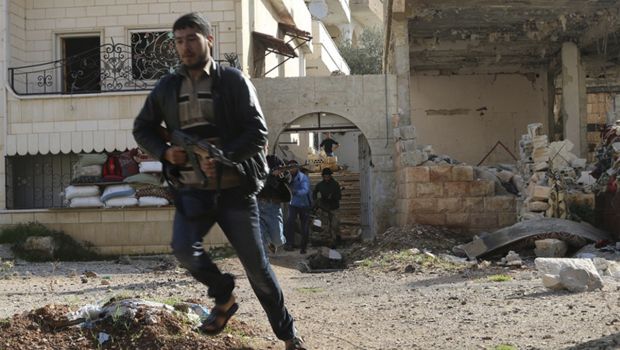
A rebel fighter carries his weapon as he runs near the frontline against forces loyal to Syria’s President Bashar Al-Assad in Al-Manshiyeh neighbourhood in Deraa December 7, 2014. (REUTERS/Wsam Almokdad(
Beirut, Asharq Al-Awsat—Three moderate rebel factions in southern Syria have united to form a joint military command, dubbed the “First Army,” in a step they said was aimed at filling the security vacuum left by retreating government forces.
In a video posted on YouTube, fighters operating broadly under the Western-backed Free Syrian Army (FSA) in southern Dera’a province said they agreed to “form an organized military body . . .to meet the aspirations of the Syrian people to topple the regime and establish a state of law and justice.”
The newly-formed military command, mainly consisting of officers who defected from government forces and volunteers, said it was seeking to “unify all FSA factions under a joint military command.”
“We aim to establish a state of law and order and confront sectarian militias seeking to divide the people and create a state of chaos and instability,” the announcement said.
Estimates about the First Army’s actual fighting strength vary. The group claimed to have 15,000 fighters, although local activists put the number at closer to 5,000.
Commenting on the announcement, FSA Military Command Higher Council member Rami Dalati told Asharq Al-Awsat that the move comes as part of the “reconstruction of the FSA.”
He said that the new FSA military command has been established “in light of the receding military influence of the Syrian regime which has left a security and administrative vacuum in its wake [in southern Dera’a].”
Dalati added that the First Army will seek to stop the expansion of extremists in the area, in reference to the Al-Nusra Front, Al-Qaeda’s franchise in Syria.
The strategic province, which shares borders with Jordan, has been at the center of clashes between moderate rebels and Al-Nusra Front fighters.
“The establishment of the First Army will strengthen ties among [rebel] factions and boost the FSA presence on the ground,” Dalati said.
Syria’s fractious military opposition has recently seen an increasing number of its fighters lured to join radical groups, including the Al-Nusra Front and the Islamic State of Iraq and Syria (ISIS), who can offer greater financial incentives.
As for whether the merger is related to UN Envoy Staffan de Mistura’s ceasefire proposal, the FSA spokesman stressed that the establishment of the First Army was an internal military matter and has nothing to do with international peace efforts.
“We have informed the UN envoy that we reject the plan in its current form but we have not received his answer yet,” Dalati told Asharq Al-Awsat.
De Mistura’s plan calls on Syrian government and opposition forces to initially observe a ceasefire in Aleppo in order to allow humanitarian aid to reach around one million of the city’s inhabitants. However, this ceasefire would act as a prelude for other local ceasefires between opposition and government forces and provide an opportunity to reach a potential political solution to the Syrian crisis.
Moderate Syrian rebel factions have increasingly followed a policy of unifying their forces following advances by emboldened Islamists forces who, despite US-led airstrikes, remain in control of large swathes of eastern and northern Syria.
The First Army is the last in a series of rebel alliances that included the “Levant Front” in Aleppo and the “Unified Syrian Army” in western Dera’a, among others.

There are no ‘moderate factions’ in Syria. Anyone who stands around watching his country being bled by BOTH sides would have nothing to do with politics, and insist on just doping all weapons to save the civilians… As one says in Arabic, one hand can not clap alone… These types are as bad as Assad or worse!